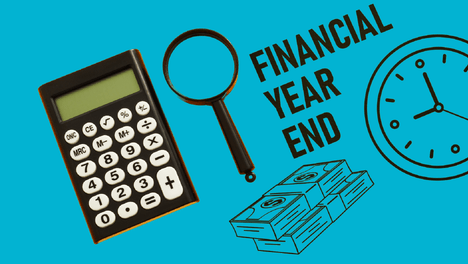If you're new to running a business, you've probably heard some daunting tales. Even seasoned business owners might have a few nerve-wracking experiences to share. Spending late nights sorting paperwork, rummaging through piles of receipts, and rushing to balance your accounts can be quite overwhelming. This is enough to instil a sense of dread in any newcomer about the end of the financial year.
But, don't worry. There's a solution that won't require sleepless nights or frantic searching. The end of the financial year doesn't have to be a burden. To make things easier, we've put together our top tips to help you manage your year-end accounting smoothly and set you up for a successful start to the new financial year.
If you're pressed for time, feel free to download our handy end-of-financial-year checklist right here 🤓
Before you hand everything over to your accountant or tax agent to file your tax returns with Inland Revenue, you need to get your accounts in order.
Tackle Unpaid Invoices
Have some unpaid invoices fallen off your radar? It's time to take control. If you're already sending email reminders, pick up the phone and check if they received any of the emails. Make an effort to collect as much of this owed money as possible. This not only helps in improving your cash flow but also ensures you know what's happening if you need to start managing bad debts.Do a Stocktake
For any business that holds stock or materials, carrying out an inventory check is crucial. This is an excellent opportunity to adjust the quantities of stock as required and to create a current list of all your stock.Record All Business Costs
Whenever you spend money on something essential for your business's daily operations, it's considered a business expense. If you've bought anything for your business using your personal account or credit card, don't worry. Just keep the receipt, and this will be considered as money you've invested into your business.Sort Out Your Documents
It's crucial to have all the necessary papers that validate your earnings and expenditures. These include copies of bank and loan statements, invoices from suppliers, any credit card or hire purchase statements, payment records to contractors or employees, and receipts for all expenses (including purchases of assets or maintenance costs). Equipment, vehicles, furniture and fixtures costing more than $1,000 may need to be added to the fixed assets register so you will need to provide the bill or receipt for these items too. IRD mandates that you keep a record of your income and expenses for seven years. By utilising a cloud accounting system like Xero, you can make this process more efficient, giving you the ability to access your records at the click of a button.Complete Payroll Tasks
Do you have employees? It's time to review their salary and wage information and update any pay rates as required by law. Don't forget, the new minimum wage comes into effect on 1st April, so make sure your payroll is ready to go.KiwiSaver – Government contribution
If you qualify for the KiwiSaver Government Contribution, ensure you deposit at least $1,043 into your KiwiSaver account each year between 1st July and 30th June. It's a good time to check if you're on track with this. The Government will add 50 cents for every dollar you deposit, up to a maximum of $521.43. KiwiSaver may take a few days to process your deposit, so it's wise to make the transfer well ahead of time.Review your finances - While it might seem appealing to close your accounts and put off thinking about the end of the financial year until it comes around again, this is actually the perfect opportunity to evaluate your business's financial performance and identify areas for improvement.
Once you've balanced your accounts, organized your documents, and generated your reports, you'll have a clear picture of your business's performance over the past financial year. Take some time to reflect on what worked well and what didn't. Set new goals and consider changes that could help your business grow and operate more efficiently.
This could mean cutting down on costs, investing in new equipment, hiring a certified bookkeeper (like us!) so you can prioritise activities that drive revenue for your business or talking to us about implementing tools that can automate your administrative tasks - making the end of the financial year a breeze next time around!

